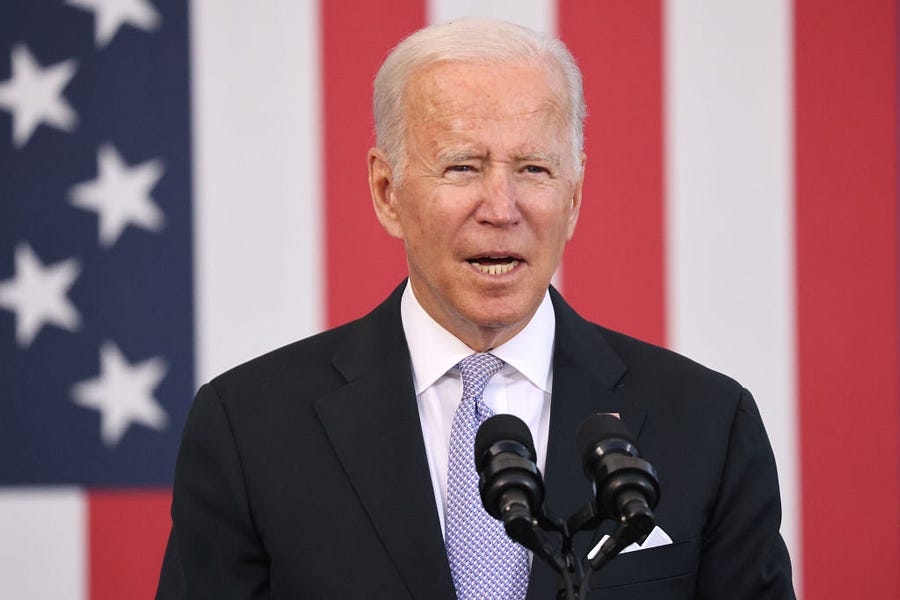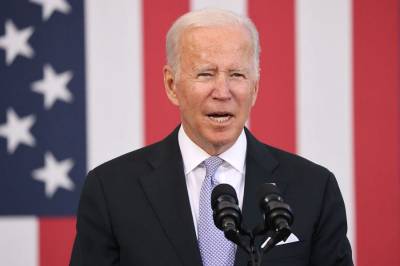During a town hall appearance on CNN Thursday night, President Joe Biden claimed that the U.S. has a “commitment” to defend Taiwan. “So, are you saying that the United States would come to Taiwan’s defense if China attacked?” CNN’s Anderson Cooper asked. “Yes,” Biden replied before Cooper could even finish his question. “Yes, we have a commitment to do that,” the president emphasized.
If Biden meant what he said, then it would be a big deal. The U.S. government has long maintained a posture of “strategic ambiguity” with regards to Taiwan’s fate should the Chinese Communist Party (CCP) finally decide to end the tiny island nation’s autonomy. Across administrations, both Democratic and Republican, the U.S. hasn’t said what it would do, exactly, in that scenario.
But it quickly became apparent that the president didn’t really mean what he said. The White House walked back Biden’s remarks after the press asked if the era of “strategic ambiguity” had come to an end. “The U.S. defense relationship with Taiwan is guided by the Taiwan Relations Act,” a White House spokesperson told Politico. “We will uphold our commitment under the Act, we will continue to support Taiwan’s self-defense, and we will continue to oppose any unilateral changes to the status quo.”
The Taiwan Relations Act does not stipulate that the U.S. will rise to Taipei’s defense in the event of an invasion by Beijing. Instead, the U.S. Congress has committed to provide for Taiwan’s “self-defense”—just as the White House was forced to clarify.
Nevertheless, President Biden’s comment drew a swift rebuke from China’s foreign ministry. “Taiwan is an inalienable part of China's territory,” CCP spokesperson Wang Wenbin said in response. “The Taiwan question is purely China's internal affairs that allow no foreign interference.” Wang went on to “urge the U.S.” to “be prudent with its words and actions on the Taiwan question, and avoid sending wrong signals to the ‘Taiwan independence’ separatist forces, lest it should seriously damage China-US relations and peace and stability across the Taiwan Strait.”
In one sense, Biden’s comments may be seen as mildly embarrassing, as he may not even know what America’s official policy with respect to Taiwan really is. On the other hand, didn’t Biden just contribute to the “strategic ambiguity”? Ambiguity is the opposite of clarity. If you are a Chinese strategist today, then you’d have to at least consider the possibility that Biden would attempt to defend Taiwan against an invasion. Whether the U.S. could do so successfully remains in doubt—but that only compounds the uncertainty.
Putin downplays partnership with China, while blasting NATO.
Half a world away in Russia, Vladimir Putin is attempting to maintain his own strategic ambiguity with respect to China. In the past, Putin has openly floated the possibility of entering a military alliance with the CCP. During his remarks yesterday, however, the former KGB man cast his country’s relations with China in a slightly different light.
“We are friends with China not against anyone else, but in each other’s interests, this is first,” Putin said yesterday, according to the Russian news agency TASS. “Second, unlike NATO countries, we are not creating any closed military alliance or any military bloc between Russia and China.”
Some may see Putin’s remarks as an outright rejection of the idea that Russia could establish a formal “military alliance” with China. But the context behind Putin’s remarks is key. Regardless of whether the two countries agree to formally defend one another, they are cooperating on a broad range of military and non-military endeavors. Moscow and Beijing don’t need to call it an “alliance” to be, in a broad sense, allied.
More importantly, Putin was trying to undermine the rationale for NATO’s new defense plans. Hours before Putin rejected the idea of a Russia-China “military bloc,” NATO let it be known that it had crafted a new strategy to counter Russian aggression. “The confidential strategy aims to prepare for any simultaneous attack in the Baltic and Black Sea regions that could include nuclear weapons, hacking of computer networks and assaults from space,” Reuters reported.
Earlier this month, NATO revoked the accreditation of eight Russian officials, meaning they can no longer meet with the alliance’s headquarters in Brussels. NATO accused the Russians of clandestinely working for the Kremlin’s intelligence organs. NATO also cut the size of the Russian delegation in half from 20 to 10 members.
Needless to say, the Kremlin is not pleased with NATO’s moves. The Kremlin retaliated earlier this week by ordering NATO to close its office in Moscow.
It was in this context that Putin tried to downplay Russia’s ties with China. Similarly, other Russian officials have accused NATO of hyping the Moscow-Beijing partnership to justify its own existence. For example, Russia’s Deputy Minister of Foreign Affairs, Alexander Grushko, appeared on Russian television yesterday to blast NATO’s plans. Grushko taunted the Western military alliance over its defeat at the hands of the Taliban in Afghanistan.
“Against the background of NATO's ‘successes' in Afghanistan, it became clear that the image of the Russian threat that NATO has been fostering in recent months was somehow losing its appeal and it was necessary to refresh the Russian agenda, and to put it at the center of NATO's efforts,” Grushko said. “I think it will be used to continue vilifying Russia and building the concept that NATO is now dealing not only with the Russian threat, but also with the joint Russian-Chinese threat.”
Putin taunted NATO as well. The Russian autocrat said he could envision removing the Taliban’s men from the United Nations’ sanctions list. Such a move, which would require the blessing of the U.S. and other member states on the U.N. Security Council, would allow the Taliban (and al-Qaeda) to raise even more funds around the globe. Thus far, it does not appear the Biden administration is willing to delist the Taliban’s leaders. Putin also praised the Taliban for fighting the Islamic State—even though the Taliban remains closely allied with al-Qaeda, which also battles the former caliphate’s men in Afghanistan and elsewhere. In an attempt to rub even more salt in the wound, Putin called for NATO to stabilize Afghanistan’s economy, saying it was the responsibility of the U.S. and its allies after 20 years of war. Tellingly, Putin didn’t blame the Taliban and al-Qaeda for waging that war. Putin did argue that NATO’s member states should unfreeze billions of dollars in cash that had been earmarked for the now deposed Afghan government. Thus far, the Biden administration has resisted that move, as there are good reasons to think that this money would just benefit the jihadists’ cause, and not really the Afghan people.
Putin said something else yesterday that explains how he sees the world. The “Western dominance in global affairs” that began “several centuries ago and that almost became absolute for a short period in the late 20th century, now gives way to a much more complex system,” Putin said. He added that the change in the “balance of powers implies a redistribution … in favor of those growing and developing countries that have been feeling left behind until now.”
Of course, China is No. 1 on the list of “growing and developing countries” that now want their share of international power. Putin knows that all too well.






Please note that we at The Dispatch hold ourselves, our work, and our commenters to a higher standard than other places on the internet. We welcome comments that foster genuine debate or discussion—including comments critical of us or our work—but responses that include ad hominem attacks on fellow Dispatch members or are intended to stoke fear and anger may be moderated.
With your membership, you only have the ability to comment on The Morning Dispatch articles. Consider upgrading to join the conversation everywhere.